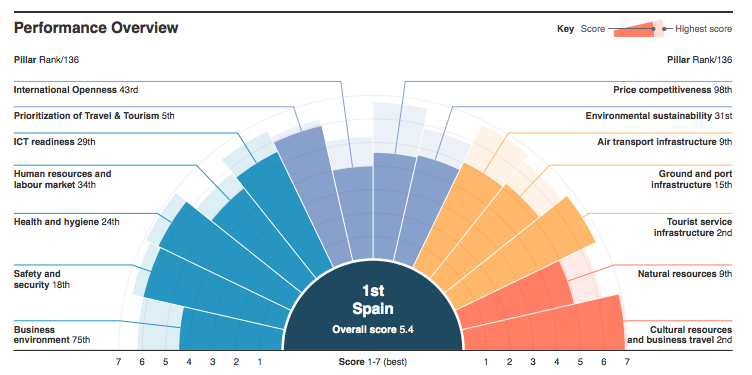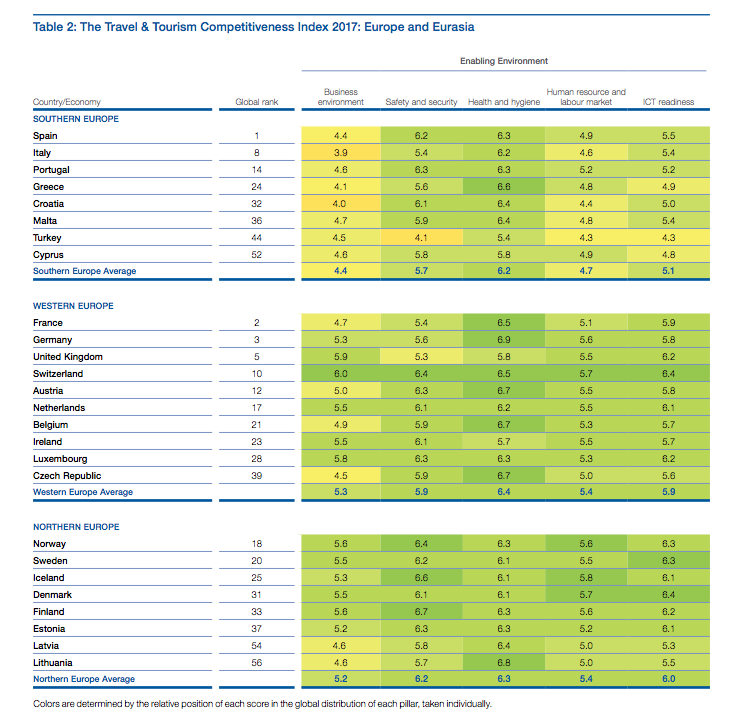Let’s talk about one of the largest and fastest-growing industries on the planet, and no, we’re not talking about food delivery apps. Did you know the travel & tourism industry out-performed the global economy as a whole for the sixth straight year despite geopolitical upheaval (read “terrorism”) and economic uncertainty?
Well, it did, and the stakes are enormous world-wide.
The Geneva-based World Economic Forum just released its Travel & Tourism Competitiveness Report 2017, and as you might suspect, we wouldn’t be posting this if Europe wasn’t dominating.
One of the most interesting take-aways for expats is that T&T is facing a major shortfall of talent, especially across Europe. Which means lots of career opportunities. More on that in a minute.
Because we’re Euro-centric, we’re going to look at the results most pertinent to expats here. And, may we say, you’ve so chosen the right continent. Europe is far and away the choice destination for most travelers around the world with a T&T market almost twice as large as Asia-Pacific, the second largest (and fastest growing) market.
Europe has six of the 10 most competitive countries in the T&T sector, according to WEF researchers, attracting – get this – 620 million of the 1.2 billion international visitors in 2016.
This is way more than a “best beaches” report. This is a mega-report, with 387 pages of facts, figures, and data. (There are three parts to the report – The Travel and Competitiveness Index 2017; Views from Leaders in Travel & Tourism and individual country profiles.)
Let’s get to the juicy bits first.
Spain, France, Germany at the top of travel & tourism
Here’s the global Top 10 for 2017:
- Spain 1 5.43
- France 5.32
- Germany 5.28
- Japan 5.26
- United Kingdom 5.20
- United States 5.12
- Australia 5.10
- Italy 4.99
- Canada 4.97
- Switzerland 4.94
All the Top 10 are the same from 2016 with the exceptions of the United States, which dropped to No. 6 from No. 4, and Switzerland, which dropped four places to No. 10 from No. 6.
For all its publicity lately as the hottest destination in the world, Portugal managed to only take the No. 14 spot, and Greece – one of the most popular destinations in Europe – is ranked at No. 24, one place behind the Republic of Ireland.
So, what gives? Well, the WEF ranks on these overall criteria: Business environment; safety & security; health & hygiene; human resource & labor market and ICT readiness. (ICT stands for “information and communications technology” … the nation’s ranking as a wired destination.)
Opportunities for international talent
So, where are the opportunities for expats?
Everywhere …
The report states that a “comprehensive model for Smart Travel, one that includes Smart Visas, Smart Borders, Smart Security processes and Smart Infrastructure, will revolutionize the travel and tourism sector the way the smartphone has transformed the telecommunications and media industries, bringing job creation and growth along with it.”
So, while the hospitality segment will continue to grow worldwide and need international management talent for high-touch positions, we think it’s obvious the most lucrative opportunities will be in tech.
From the report:
According to our research, over the next decade (2016 to 2025), digitalization in aviation, travel and tourism is expected to create up to $305 billion of value for the industry through increased profitability, migrate $100 billion of value from traditional players to new competitors, and generate benefits valued at $700 billion for customers and the wider society through reduced environmental footprint, improved safety and security, and cost and time savings for consumers.
The long and short of this is, probably no other industry segment offers as many opportunities for educated multi-lingual expats – especially techpats – as travel & tourism.
This is the ultimate growth industry.
Spain wins by doing everything well
With the WEF methodology, the top rankings go to the countries that do everything well.
Spain is tops because it scored well on cultural (2nd) and natural resources (9th), according to the report. Spain also has a very strong service infrastructure (2nd) and air transport connectivity (9th).
Portugal finishes just behind Spain on safety and security but exceeds its Iberian rival in the health & hygiene score. Spain also gets extra credit in sub-category scoring on its ranking for prioritization of travel & tourism. Like we said, this isn’t a beauty contest. This is about real big-data number crunching.
The bottom line is, almost every country in Europe has tourism figured out, even little Albania, which makes the Most Improved list.
Also, you’ve probably read posts about the WEF research designating Finland as the safest country in the world. Which is true.
But Iceland, Switzerland, Norway, Sweden and a gaggle of other European destinations score incredible safety rankings. Most of Europe is incredibly safe compared to No. 84 United States.
Amazing “did you knows” from the report:
• Tourism and travel account for one out of 10 jobs on the planet.
• For every 30 new tourists to a destination, one new job is created.
• Travel and tourism as an “industry” has almost twice as many women employers as other sectors.
• Accounting for 30 percent of world services exports, tourism is the largest export category in many developing countries
• While tourism was mainly a thing for North Americans and Northern Europeans, that’s changing rapidly. Outbound travel from Africa, the Middle East and Asia-Pacific is expected to grow exponentially in the coming decade, according to the WEF report.
Methodology
The T&T Competitiveness Index measures four broad factors of competitiveness. These factors are organized into subindexes, which are further divided into 14 pillars: The Enabling Environment subindex, which captures the general settings necessary for operating in a country: 1. Business Environment 2. Safety and Security 3. Health and Hygiene 4. Human Resources and Labour Market 5. ICT Readiness
About the World Economic Forum:
WEF is an international organization encouraging public-private cooperation. The Forum engages the foremost political, business and other leaders of society to shape global, regional and industry agendas. It was established in 1971 as a not-for-profit foundation and is headquartered in Geneva, Switzerland. It is independent, impartial and not tied to any special interests.
















